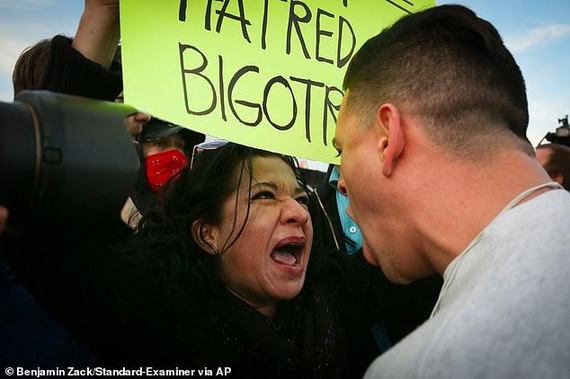With all our technology prowess, almighty analytics and big data galore we failed to predict the results of the presidential election. It is a sobering lesson for the media. It is a sobering lesson for data science. It is sobering lesson for politicians. It is a sobering lesson for every one of us. Whether we were on the "winner" of "loser" side, whether we "got what we wanted" or "didn't get what we wanted", this historic election emphatically exposed the troublesome blindness that impairs our leadership and politics. It emphasized the formidable short-sightedness of our views. And it made a sizable crack in our societal fabric.
A Crisis of Leadership and Society
Filmmaker Michael Moore blamed the Liberals: "You were in a bubble and weren't paying attention to your fellow Americans and their despair". He had a good point. We clearly missed the "Inner Voter". So did the Brits with Brexit. The malaise that is perturbing America today points to a more serious problem than an electoral failure, it underscores how global leaders are out of touch with the despair of citizens.
But without letting political leaders off the hook, I'd like to suggest that we also point the finger inward and realize that as citizens we are not paying attention to our fellow Americans either. We were all so full of our "rightness" that we missed what was brewing underneath the surface of the polls, inside American homes, and in the hearts of voters. We failed to discern the rampant despair of a large portion of Americans. The Democratic leadership was blind to the desperation of rural voters. Donald Trump (to his credit) recognized it and tapped into it to win. He is still blind to the despair of many groups.
I use the term "Inner Voter" to refer to the hidden needs of our fellow citizens. It applies to people we don't know. They may live next door or a thousand miles apart, but figuratively they are always miles apart from our consideration. We don't concern ourselves with their well being. Worse we don't care. The Inner Voter represents the deep needs of people we ignore. It also refers to the deep needs of people we know. The Inner Voter represents the part of them that we negate and don't care to understand. Friends, family members and colleagues who voted for the "other" candidate are a good example.
Calling All Political Leaders and Citizens
The election showed us the depth of our divide. It revealed the Inner Voters behind the masks. And they were not what many of us expected nor wanted to believe. Where do we go from here? Whether we are on the "blue side" or the "red side", we can't keep our heads in the sand, and keep ignoring the despair of large groups of Americans. It holds our country back.
The times are calling for us to demonstrate empathetic understanding. Band-aid policies based on blind and incomplete understandings of the root problem are not the solution. We need to re-evaluate our policies and agenda in light of the new understanding that surfaced in the post election malaise. But this is not just the work of politicians. Each and every one of us can make a difference. We all know people we ignore, or people we know well but dismiss on some level. If we want politicians to live up to those ideals, we need to live up to them as well.
Let us start with our friends and family. Can we remain friendly to loved ones who voted for the "wrong" candidate? Can we seek to understand the deep seated needs that drove their choices without blaming them, trying to fix them, or banning them from our lives? A colorful New York Times article showed that we are not ready to share Thanksgiving dinner with family members who didn't vote like us. This is disturbing. Can we find the willingness to get inside their mind and seek to understand why they voted that way? Can we still greet them from a place or common humanity, and realize that regardless of their vote they are human beings who want to be happy and free from suffering just like us? They thought the "other" candidate would be more able to fulfill their needs, and they voted accordingly.
Calling All Business Leaders
Beyond our friends and family circles, can we bring more humanity to our workplace? Can we be curious to understand the deep human needs of those we lead and serve? Can we be curious to examine where dissatisfaction festers inside our companies? Can we do a better job at managing diversity and inclusion? Can we seek to understand the Inner Employee who is fed up by his job, bullied, or abused and desperately seeking a way out?
Similarly, can we seek to see the Inner Customer whose needs are not satisfied by our products and services? He may have left us for the competition, or is resignedly buying our product because there is no other alternative? Can we bring empathetic curiosity to his needs and be motivated to deliver enduring happiness?
Let us create safe spaces for others to share their fears, views and aspirations without being diminished for thinking differently, or looking differently. Let us not bring the political divide that paralyzes our country into our homes, and companies.
I once heard the story of a Zen master who was pouring tea into the cup of his student. When the cup was filled, he kept pouring. The student asked him why. To which the Zen master replied: "Similarly, you are too full of your ideas to hear what I am telling you". We are too full of our rightness to hear the needs of others. May this election inspire us to empty our cups, and see our fellow Americans as human beings who want to be happy, just like us.

